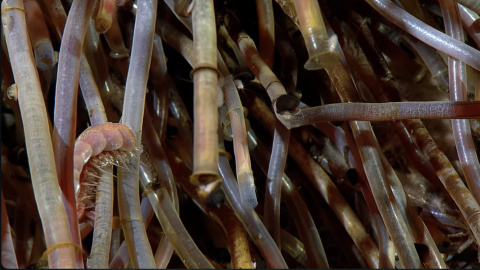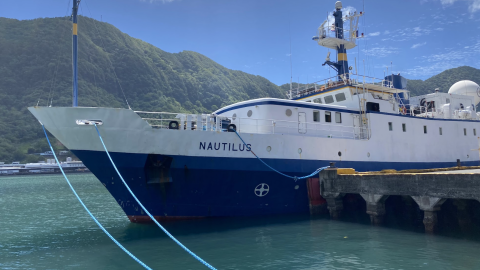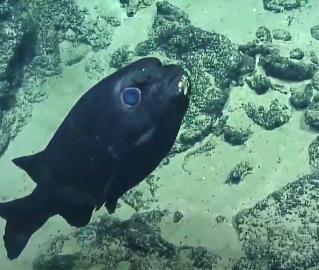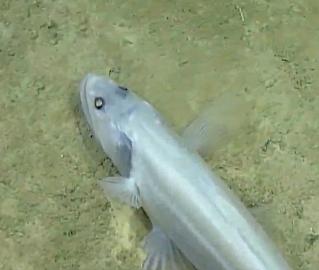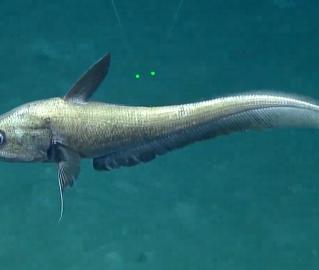Meet Ocean Explorer Max Luthy
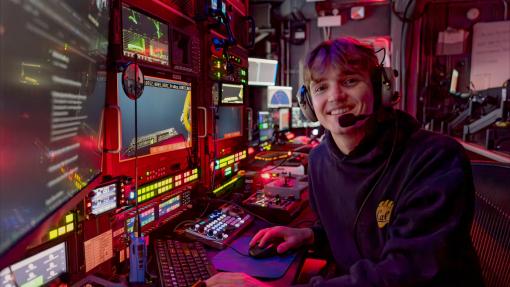
OET proudly welcomes Max Luthy to the Corps of Exploration as part of the Science & Engineering Internship Program. This internship program supports community college, undergraduate, and graduate students in building professional workforce experience and exploring STEAM-related careers that connect to research themes like robotics, ocean science, education, and exploration. Max joins E/V Nautilus for our NA167 and NA168 expeditions as a video engineering intern.
We sat with Max to learn more about his experience at sea and the path that led him to Nautilus.
Describe your role with OET:
On board the Nautilus, I am currently serving as a video engineering intern. This means I am responsible for helping ensure that the livestream is delivered as a refined piece of content. During ROV dives, I serve as one of the main camera operators for the ROVs Hercules and Atalanta while also monitoring and fine-tuning audio levels. When I am off watch, I help maintain, monitor, and troubleshoot all of the many cameras, video routers, and intercom systems on board the Nautilus.
Can you tell us a little about your background? What influenced you as a child?
As a child growing up in the Pacific Northwest, I was lucky to have parents who loved the outdoors. My mom is an environmental educator who teaches ecology to elementary and preschool students. She has always employed her own creative curriculums and analogies to get kids excited about our bizarre and wonderful world. However, I do not think she could be as successful as she has been without her contagious enthusiasm. I took her teaching methodology to heart, and volunteered at the Seattle Aquarium all throughout high school, spreading enthusiasm for the bizarre and wonderful ocean creatures that I love so much. While at the Seattle Aquarium, seeing that I could get kids excited about things like asymmetrical caudal fins and rockfish diversity showed me that science communication/environmental education was something I would love to do full time.
When you were a kid, what did you want to be when you grew up?
Ever since I was a little boy, I wanted to be a marine biologist. The Seattle area is full of some insanely diverse intertidal habitats, and being exposed to that on a regular basis could make anyone want to study the ocean. I still vividly remember sometime around 2013 when our vibrant beaches suddenly lost a huge amount of their color during the start of the sea star wasting epidemic. Witnessing a drastic change in habitat regime occur so suddenly was as fascinating as it was concerning. Yet despite the epidemic’s widespread nature, its cause was not understood. While I was only 12 years old then, the idea that something with such a huge impact could be so poorly understood cemented to me that I wanted to study marine biology.
What would you consider to be your greatest challenge entering this field?
Within the field of filmmaking, the greatest challenge I face is the anxiety that comes with sharing my work. While STEM is a fairly straightforward field with a more objective sense of the ‘right’ way to do things, filmmaking has no real correct methodology. At the end of the day, whatever feels like a more powerful expression of your ideas is what you should be doing. To me, this has always made filmmaking a deeply personal experience, and each piece of media I work on feels like a small piece of me. This also makes it much harder to want to share these pieces of myself with the public, when judgment feels so much more personal. However, I think if you can always keep a positive mindset to just have fun with it, you can move past these fears of judgment, and find empowerment that you get to define what a job well done means.
Do you have any advice for someone looking to follow a similar path?
As a piece of general advice, I have found the most valuable experience to just be getting on sets and behind cameras whenever I have a chance. I took some filmmaking courses in college that helped shell out the definitive production roles to me, and I got experience working in just about every position on set while also getting to do all of the post-production process on my own films. It is not just valuable to have perspective on how to do all these roles, but it's also valuable to have perspective on what roles you genuinely enjoy. For me, that looked like camera work and editing, but for many people, there is more fulfillment in other parts of the production process. I also had an opportunity to help collaborate on the film Kahu Mano about the Oceanic White Tip Sharks in Hawaii and build skills as a (very) beginner animator. I have found that every single time I am working on a film, I learn something new about myself, and take lessons on how I can do better next time. Being able to continuously learn and build your skillset as a filmmaker, and saying yes to whatever projects come your way is just about the best thing you can do to move your career forward.
What's next for your ocean studies and career?
After departing Nautilus, I will continue applying to graduate school marine biology and fisheries programs. In addition to filmmaking, I have had a lifelong passion for fish. Getting the opportunity to conduct high-level research on fish while also sharing my knowledge and getting the general public excited about whatever fish concepts would be the absolute dream. I should hopefully be participating in a crab survey in the Bering Sea this Winter, and will be continuously taking on whatever new jobs and cool opportunities arise throughout my gap year before starting grad school in the fall.
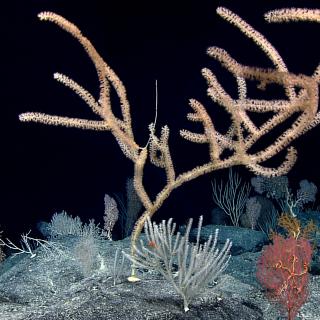
Lebuu's Voyage I - Palau
Palau National Marine Sanctuary (PNMS) –protection secured by Euotelel a Klingil a Debel Belau– is one of the most ambitious conservation efforts on Earth. Despite being rich in natural and cultural resources, there is very little data available from deep ocean habitats protected within PNMS. Working closely with the Palau International Coral Reef Center (PICRC), NOAA Ocean Exploration, and other Palauan and U.S.
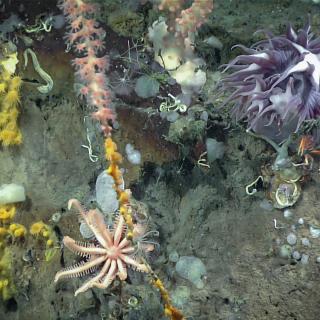
Lebuu's Voyage II - Palau
Building on the progress in the first expedition, this 11-day expedition will continue exploring Palau National Marine Sanctuary (PNMS) to understand seafloor features and the biodiversity that call deep sea habitats around Palau home. Specific cruise objectives will continue to be refined as we work with community and scientific partners.
